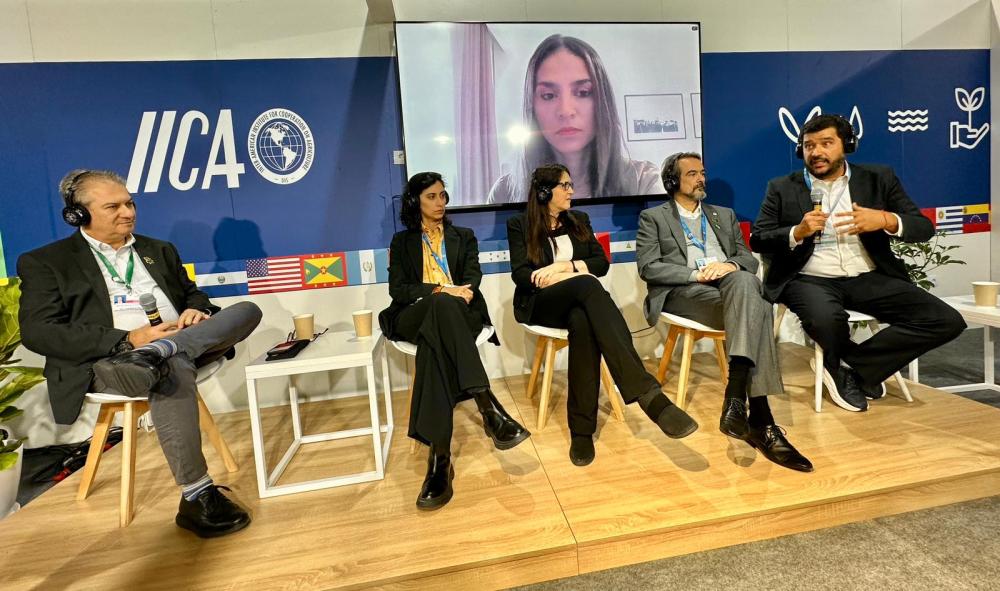These were some of the most powerful messages that emerged from one of the technical events held at the Home of Sustainable Agriculture of the Americas pavilion, set up by the Inter-American Institute for Cooperation on Agriculture (IICA) and its partners at the Olympic Stadium in Baku

BAKU, Azerbaijan, 19 November 2024 (IICA). The fact that there is a direct correlation between natural plant cover and productivity means that the agriculture of the future will need native forests and vegetation, as it will have to be compatible with nature to maximize production at higher temperatures.
Furthermore, this symbiosis of agriculture and nature is what will facilitate access to international markets and ensure that crop and livestock farmers remain in rural areas, which is essential for food security and for the livelihoods and prosperity of rural and urban communities.
These were some of the most powerful messages that emerged from one of the technical events held at the Home of Sustainable Agriculture of the Americas pavilion, set up by the Inter-American Institute for Cooperation on Agriculture (IICA) and its partners at the Olympic Stadium in Baku, the capital of Azerbaijan, host of COP29, the world’s most important forum for environmental and climate negotiations.
For the third consecutive year, IICA, its Member States and private sector organizations set up a pavilion, this time in Baku, to enable the voice of the agriculture sector to be heard in the climate and environmental negotiations. The latter will determine, among other things, the allocation of funds to finance adaptation and mitigation actions, given the current scenario of rising temperatures, a phenomenon that increases the risks of the already risk-plagued activity of producing food, fiber and energy.
“Feeding the next billion: the model for building climate resilience in agrifood systems” was the title of the event, which featured Marcello Brito, Executive Director of the Consorcio Amazonia Legal; Liege Correia, Director of Sustainability at the animal protein giant JBS; Ana Paula da Silva, from the Fazenda Cigana agricultural enterprise; André Guimaraes, Executive Director of the Amazon Environmental Research Institute (IPAM); Nathalie Walker, from the National Wildlife Federation; and Marcelo Behar, from the World Business Council for Sustainable Development (WBCSD).
Britto, who spearheads the actions of the consortium of Brazil’s nine Amazonian states whose institutional mission is to speed up the sustainable development of the Amazon in an integrated and cooperative manner acknowledged the importance of IICA’s technical assistance to Brazilian producers and called for more work based on studies of the impact of greenhouse gas emissions in the Amazon rainforest.
He also praised Brazilian agriculture, which he described as world-class, noting that Brazil is the world’s third largest exporter of agricultural products and fourth biggest producer, and the country with the fifth largest acreage planted.
André Guimaraes, from IPAM, a scientific, non-governmental organization dedicated to the sustainable development of the Amazon through the generation of knowledge, the implementation of local initiatives, and influence on public policies, emphasized the relationship between plant cover and productivity, pointing out that that plant cover does not compete with production, but on the contrary, could be the factor that ensures that crops grow.
He also stressed the importance of redesigning public policy incentives to promote the intensification of production and foster the restoration of degraded areas, tasks for which technical assistance is of crucial importance.
JBS’s Liege Correia highlighted Brazil’s capacity to increase production without increasing the acreage used for agricultural activities, and explained her company’s ambitious plan to launch “green offices” to provide support to its suppliers with socio-environmental regularization processes.
The objective of the green office program is to ensure that producers remain in the countryside and do not become marginalized in the deforestation market.
Behar, who also heads the Brazilian chapter of the WBCSD, stressed the importance of the Nature Agenda, to connect nature to, and incorporate it into, the activities of crop and livestock farmers.
Farmer Ana Paula da Silva emphasized the value added that sustainability brings to agricultural activities and production, and highlighted Fazenda Cigana, located in the south of the State of Minas Gerais, in southeastern Brazil, as a “complete, 100% circular farming operation.”
More information:
Institutional Communication Division.
comunicacion.institucional@iica.int











